新概念英语第三册 Lesson 26 Wanted:a large biscuit tin 课件 (共31张PPT)
文档属性
| 名称 | 新概念英语第三册 Lesson 26 Wanted:a large biscuit tin 课件 (共31张PPT) | 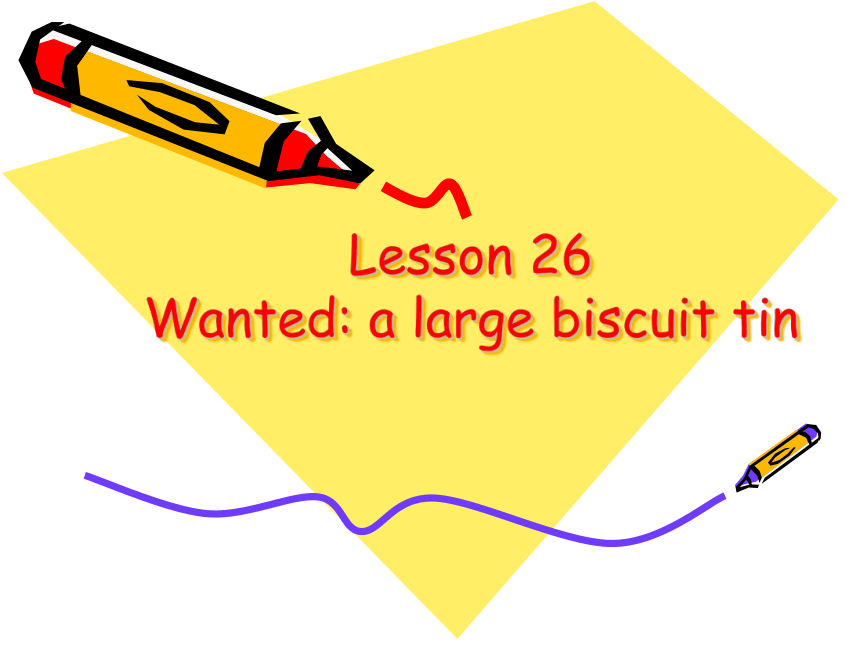 | |
| 格式 | ppt | ||
| 文件大小 | 522.5KB | ||
| 资源类型 | 教案 | ||
| 版本资源 | 新概念英语 | ||
| 科目 | 英语 | ||
| 更新时间 | 2023-10-05 22:17:46 | ||
图片预览

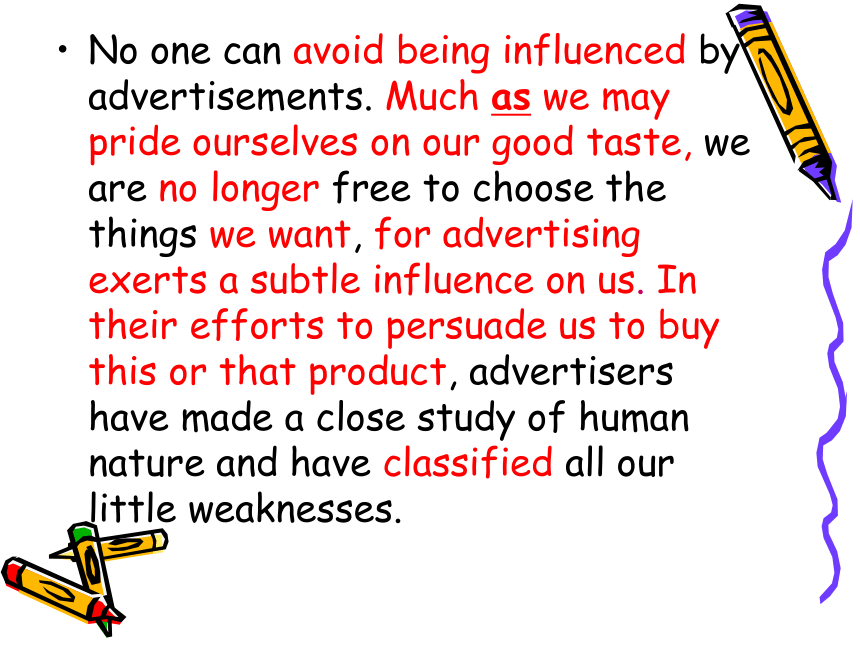
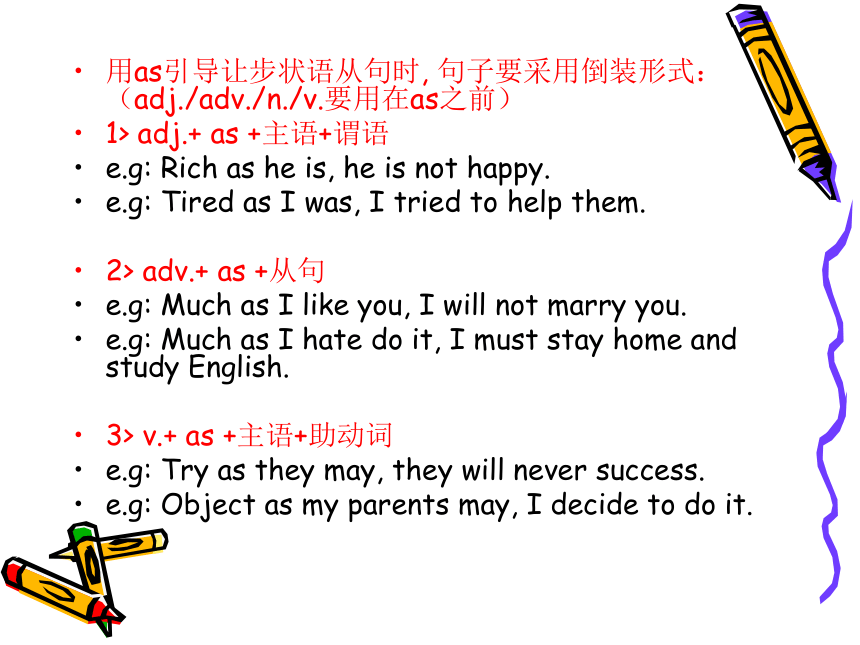
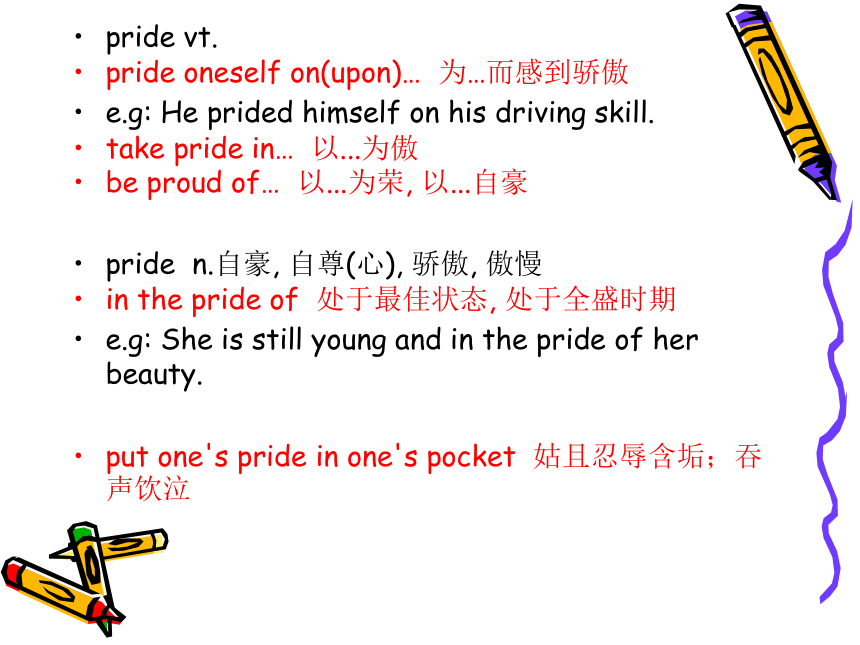

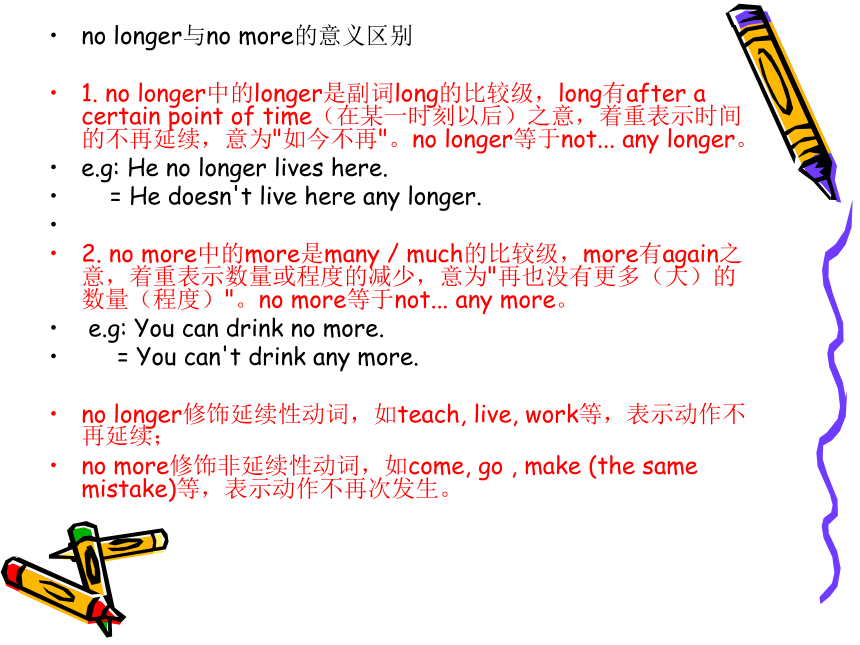
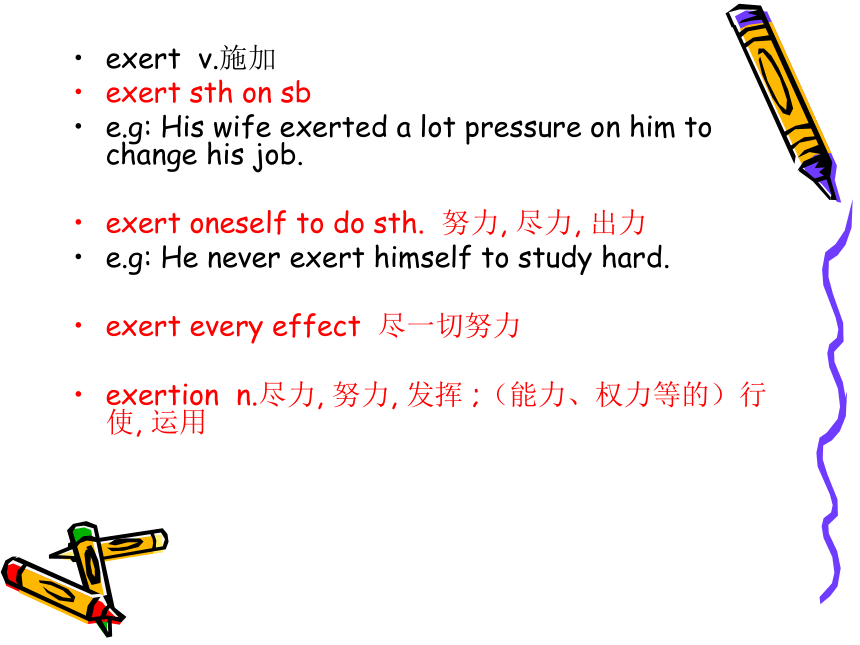
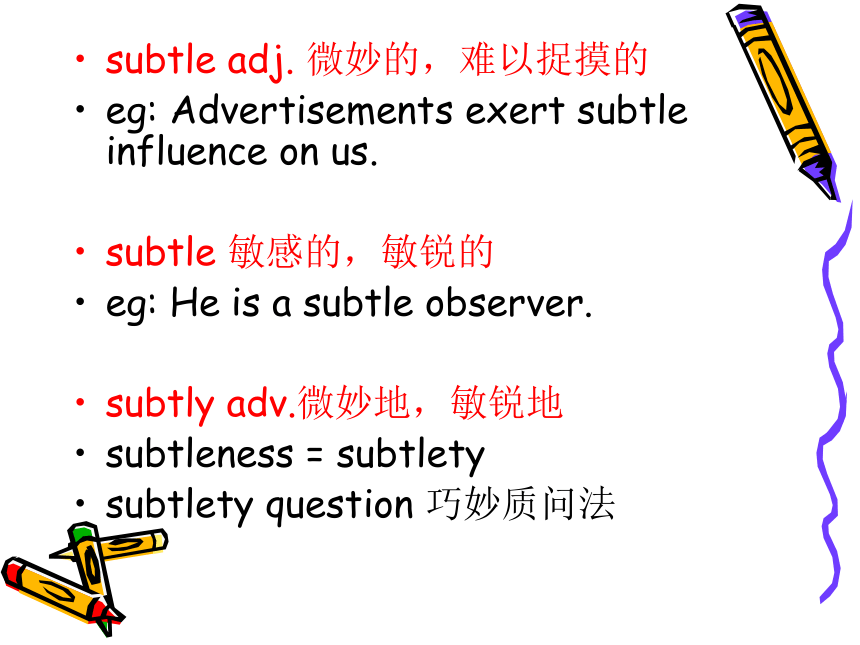
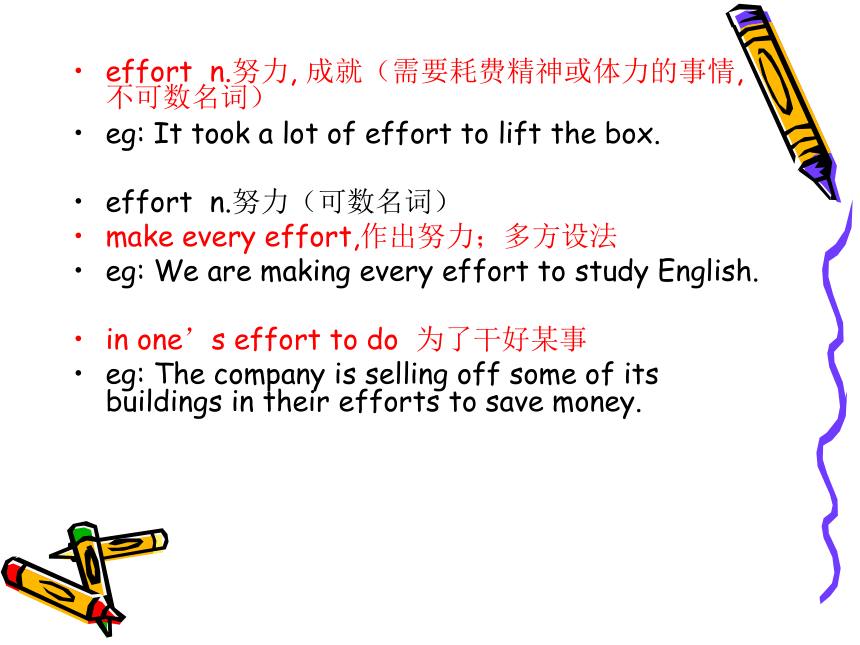
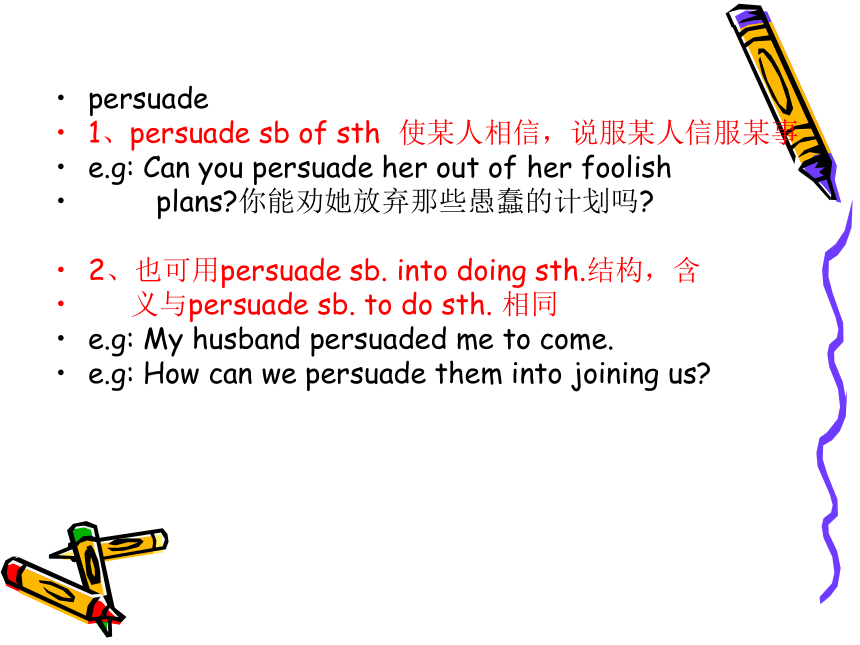
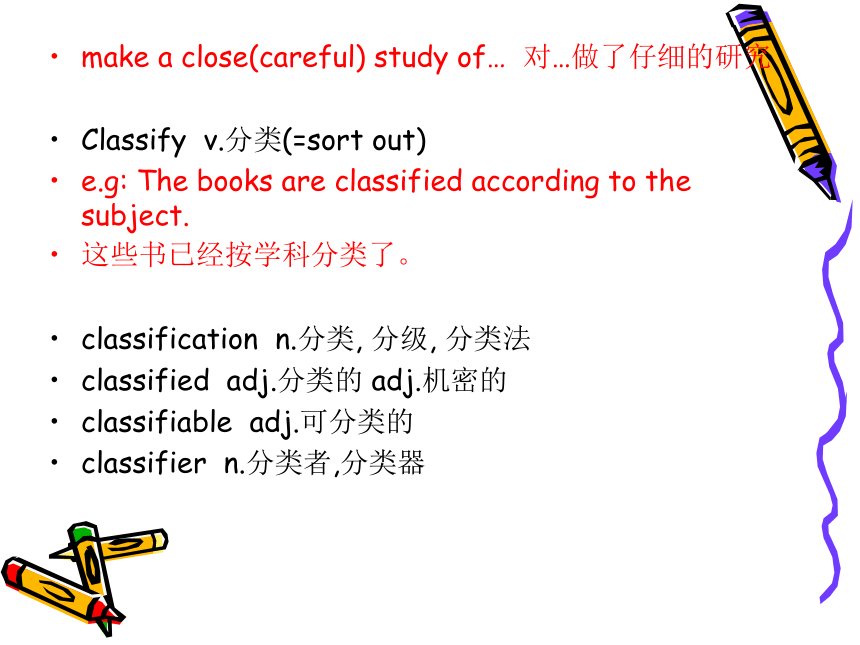
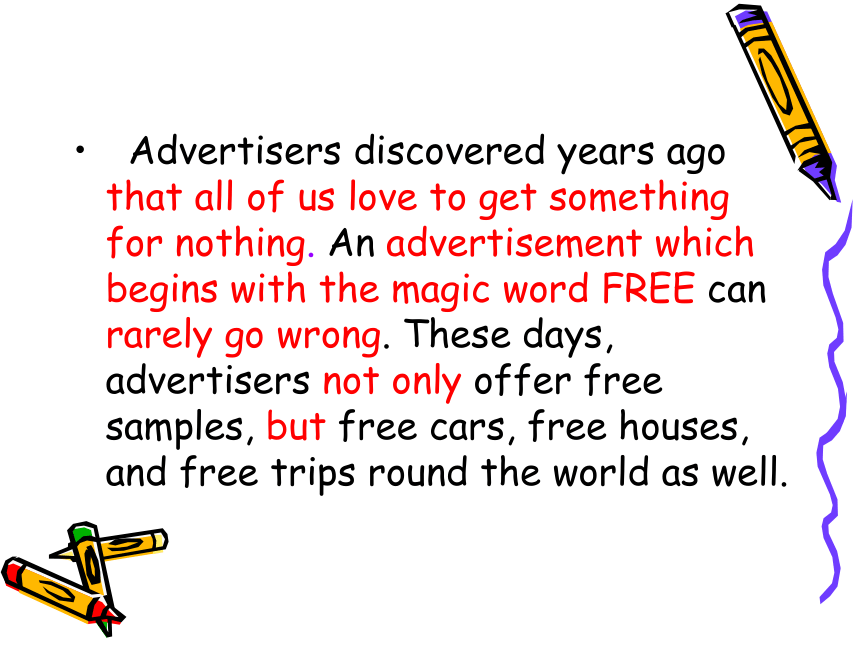
文档简介
(共31张PPT)
Lesson 26
Wanted: a large biscuit tin
No one can avoid being influenced by advertisements. Much as we may pride ourselves on our good taste, we are no longer free to choose the things we want, for advertising exerts a subtle influence on us. In their efforts to persuade us to buy this or that product, advertisers have made a close study of human nature and have classified all our little weaknesses.
用as引导让步状语从句时, 句子要采用倒装形式:(adj./adv./n./v.要用在as之前)
1> adj.+ as +主语+谓语
e.g: Rich as he is, he is not happy.
e.g: Tired as I was, I tried to help them.
2> adv.+ as +从句
e.g: Much as I like you, I will not marry you.
e.g: Much as I hate do it, I must stay home and study English.
3> v.+ as +主语+助动词
e.g: Try as they may, they will never success.
e.g: Object as my parents may, I decide to do it.
pride vt.
pride oneself on(upon)… 为…而感到骄傲
e.g: He prided himself on his driving skill.
take pride in… 以...为傲
be proud of… 以...为荣, 以...自豪
pride n.自豪, 自尊(心), 骄傲, 傲慢
in the pride of 处于最佳状态, 处于全盛时期
e.g: She is still young and in the pride of her beauty.
put one's pride in one's pocket 姑且忍辱含垢;吞声饮泣
taste n.鉴赏力
have excellent taste in sth 在…上有极高的品位
e.g: She has excellent taste in dress.
a taste of 尝一口, 尝一点
e.g: Oh, let me have a taste of your coffee.
in good taste 得体, 大方
e.g: The beautiful girl is in good taste.
in bad taste 粗俗, 不礼貌
taste of 有什么的味道
e.g: The dish taste of fish. 这道菜有鱼腥味。
to one’s taste 合某人的口味, 称某人的心愿
e.g: He did what he wanted to do to his taste.
There is accounting for taste. 【谚】人各有所好。
He who has never tasted bitter knows not what is sweet.
不知黄连苦, 哪知蜂蜜甜。
tastable adj.可尝的, 滋味好的 tasteful adj.有鉴赏力的
tasteless adj.没味道的, 无鉴赏力的 taste blindness n.味盲
taste marker n.时尚的首创者
no longer与no more的意义区别
1. no longer中的longer是副词long的比较级,long有after a certain point of time(在某一时刻以后)之意,着重表示时间的不再延续,意为"如今不再"。no longer等于not... any longer。
e.g: He no longer lives here.
= He doesn't live here any longer.
2. no more中的more是many / much的比较级,more有again之意,着重表示数量或程度的减少,意为"再也没有更多(大)的数量(程度)"。no more等于not... any more。
e.g: You can drink no more.
= You can't drink any more.
no longer修饰延续性动词,如teach, live, work等,表示动作不再延续;
no more修饰非延续性动词,如come, go , make (the same mistake)等,表示动作不再次发生。
exert v.施加
exert sth on sb
e.g: His wife exerted a lot pressure on him to change his job.
exert oneself to do sth. 努力, 尽力, 出力
e.g: He never exert himself to study hard.
exert every effect 尽一切努力
exertion n.尽力, 努力, 发挥 ;(能力、权力等的)行使, 运用
subtle adj. 微妙的,难以捉摸的
eg: Advertisements exert subtle influence on us.
subtle 敏感的,敏锐的
eg: He is a subtle observer.
subtly adv.微妙地,敏锐地
subtleness = subtlety
subtlety question 巧妙质问法
effort n.努力, 成就(需要耗费精神或体力的事情, 不可数名词)
eg: It took a lot of effort to lift the box.
effort n.努力(可数名词)
make every effort,作出努力;多方设法
eg: We are making every effort to study English.
in one’s effort to do 为了干好某事
eg: The company is selling off some of its buildings in their efforts to save money.
persuade
1、persuade sb of sth 使某人相信,说服某人信服某事
e.g: Can you persuade her out of her foolish
plans 你能劝她放弃那些愚蠢的计划吗
2、也可用persuade sb. into doing sth.结构,含
义与persuade sb. to do sth. 相同
e.g: My husband persuaded me to come.
e.g: How can we persuade them into joining us
make a close(careful) study of… 对…做了仔细的研究
Classify v.分类(=sort out)
e.g: The books are classified according to the subject.
这些书已经按学科分类了。
classification n.分类, 分级, 分类法
classified adj.分类的 adj.机密的
classifiable adj.可分类的
classifier n.分类者,分类器
Advertisers discovered years ago that all of us love to get something for nothing. An advertisement which begins with the magic word FREE can rarely go wrong. These days, advertisers not only offer free samples, but free cars, free houses, and free trips round the world as well.
discovered = find out
something pron. (informal) 重要的事物[人]
for nothing, 免费;无结果;徒然;(=free)
get something for nothing, 免费得到
begins with,从…开始
e.g: Let me begin with human brutalities towards those wild animals
not only...but (also)
1 连接主语时,遵循就近原则。
e.g: Not only you but also she has to attend the ceremony.
2 not only放在句首,后接句子时要用倒装结构。
e.g: Not only had the poor man been fined, but also he had been sent to prison.
3 用于 it is…that 强调结构
e.g: It is not only what we do, but also what we do not do, for which we are accountable.
4 but also的变体形式: a: 省去also,只留but;b: 省去but,只留also;c: but…as well;d: but also全部省略。
e.g: Not only does he write the words to the songs,but he composes the music as well.
5 not only…but also不能用于否定句,在英语中要用as well as 表示。
e.g: He, as well as I, doesn’t want to see the play.
6 当连接否定分句,都是倒装句,就不用but also。
e.g: Not only don’t I know the population of Nepal, I don’t know where in god’s world it is
They devise hundreds of competitions which will enable us to win huge sums of money. Radio and television have made it possible for advertisers to capture the attention of millions of people in this way.
devise vt.想出,设计;遗赠给;图谋
n.遗赠;遗赠的财产;遗赠的条款
design, come up with
e.g: We devised a scheme to help him...
enable vt.使能够, 使可能
enable sb to do sth 使某人能够做某事
e.g: Hard work will enable us to pass the examination, otherwise, no way.
sums of & a sum of 用法相似,通常后跟不可数名词,以money为最多。表示为“一笔...”
a large sum of 是指一大笔钱或现金
e.g: Parliament has voted a large sum of money to the town for a new road.
既能修饰可数名词又能修饰不可数名词的词有: a lot of, lots of, plenty of , a great / large quantity of (其后谓语用单数),quantities of (其后谓语用复数)
e.g: A great quantity of flowers was placed in the hall.
e.g: There are large quantities of food in the cupboard.
Make it possible for sb to do sth
使/让某人做某事成为可能
e.g: His few material possessions make it possible for him to move form place to place with ease.
capture vt.夺得;引起(注意、想像、兴趣)
n.捕获;占领;[计算机]捕捉
capture / absorb / attract/ catch / arrest / draw sb's attention
e.g:The whole town celebrated when two tanks were captured...
one man's undying love for the woman who captured his heart.
During a radio programme, a company of biscuit manufacturers once asked listeners to bake biscuits and send them to their factory. They offered to pay $10 a pound for the biggest biscuit baked by a listener. The response to this competition was tremendous. Before long, biscuits of all shapes and sizes began arriving at the factory.
manufacturer n.制造业者, 制造商
manufacture vt.制造,生产;虚构;加工
n.制造;产品;工厂;
(文学作品等的)粗制滥造
verb: To manufacture something means to make it in a factory, usually in large quantities.
e.g: We import foreign manufactured goods.
Manufacturable adj.可制造的
Manufactured adj.人造的
before long 不久以后
long befor 很久以前
before long(不久以后)= soon(adv.立刻, 不久)= shortly(adv.立刻, 不久)
一般来说,begin to do和begin doing可以互换,但在以下三种情况下,用to do:
1. 主语不是指人,而是it等。
e.g:It began to rain.
2. begin后接表示心理活动的词。
e.g:begin to know believe, wonder, think等。
3. begin本身是ing形式,为避免重复后接to do 即,beginning to do
One lady brought in a biscuit on a wheelbarrow. It weighed nearly 500 pounds. A little later, a man came along with a biscuit which occupied the whole boot of his car. All the biscuits that were sent were carefully weighed. The largest was 713 pounds. It seemed certain that this would win the prize.
barrow n.手推车,独轮车
汽车:automobile,autocar,car,auto
手推车:handcart,wheelbarrow
购物车:shopping trolly(手推车)
卡车:lorry(美作:truck)
sure和certain是近义形容词,均有肯定的;确信的;有把握的”的意思,它们的用法也大体相似,许多情况下可以通用。
相同点 :
1. 两者都能用于be sure/certain + about /of短语”句型中,表示对(某事)有把握”。主语必须是人,about/of之后多跟名词、代词。
e.g: I am sure/certain of his returning.
2. 两者都能用于be sure/certain to do sth句型中,表示一定会做某事”,主语可以是人,也可以是物。
e.g: Spring is sure/certain to follow winter.
3. 两者都能用于be sure/certain +从句”句型中,表示确信……”,主语只能是人,而不能是物。
e.g: Tom is sure/certain that I put the key on the table.
4. 两者都能用于make sure/certain +从句”结构中,表示确定;弄清楚”,主语只能是人。
e.g: You must make sure/certain when the bus will leave.
5. I ' m not sure…”与I ' m not certain…”意思相同。
e.g: I ' m not sure/certain where he is.
不同点
1. I ' m sure…”与I ' m certain…”均可译为我深信(确)信……”,但两者的含义却不同。前者表示一种主观上的判断或感觉,事实并不一定如此;后者强调的则是客观事实,意为主语已经知道后面的内容是既定的事实。
e.g: I ' m sure he didn ' t steal it. He isn ' t that kind of person.
e.g: I ' m certain he didn ' t break the cup. I broke it myself.
2. 如果it作为形式主语代替从句时,则其后的表语用certain,而不能用sure。
e.g: It isn ' t certain whether he will give us a report next monday.
3. 两者在作定语时含义不同sure意为可靠的;无误的”;而certain若修饰可数名词,意为某一;某些;某种;一些”,若修饰抽象名词,表示程度,意为有点;有些”。
e.g: The letter was sent by a sure hand.
e.g: A certain person called on me yesterday.
4. 在祈使句中常用sure,不宜用certain。
e.g: Be sure and remember what i told you.
5. 口语中,sure常作副词,用在肯定答语中替代surely,这时与of course,certainly意思相当,而certain不可作副词用。
—would you please turn down the radio a little bit
—sure/of course/certainly.
But just before the competition closed, a lorry arrived at the factory with a truly colossal biscuit which weighed 2,400 pounds. It had been baked by a college student who had used over 1,000 pounds of flour, 800 pounds of sugar, 200 pounds of fat, and 400 pounds of various other ingredients.
close
adj. 紧密的;亲密的;亲近的
adv.紧密地
closed
adj. 关闭着的,封闭着的;密闭着的,保密的;<美>准备好了的,定了契约的
表示大的:
big: 大的,重要的
large: 体积大,数量大
(侧重于面积、范围、容量、数量等方面)
great: 伟大
vast: 辽阔,广阔
immense: 不可测量的
enormous 重点突出数量、程度、体积;
强调程度时,语意强于big
giant: 巨大的,高大的
titanic 用于修饰人和物,体积大、力量大
huge:强调体积大 (有“very large”的意思)
gigantic 庞大的;巨人似的;硕大无比
It was so heavy that a crane had to be used to remove it from the lorry. The manufacturers had to pay more money than they had anticipated, or they bought the biscuit from the student for $24,000.
so...that...如此...以至于...引导结果状语从句。
e.g: When the football fans saw Beckham, they got so excited that they cried out.
so that引导目的状语从句时,表示“以便;为了”.
从句中常使用can /could /may /might /will /would /should等情态动词或助动词;
引导结果状语从句时,从句中一般不用can和may等词,
在so that前可以用逗号,意思是“因此;所以”。
e.g:The little boy saved every coin so that he could buy his mother a present on Mother's day.
A. "More than+名词"表示"多于……"、"非但……尤其是"
1) e.g: Modern science is more than a large amount of information.
B. "More than+数词"含"以上"或"不止"之意
2) e.g: I have known David for more than 20 years.
C. "More than+形容词"等于"很"或"非常"的意思
3) e.g: I assure you I am more than glad to help you.
D. 在"More...than..."中,肯定"more"后面的,而否定"than"后面的,约等于"是……而不是……"
4) e.g: Hearing the loud noise, the boy was more surprised than frightened.
E. "More than"或"More...than..."+含"can"的分句时表示"否定意"
5) e.g: Don't bite off more than you can chew.
Lesson 26
Wanted: a large biscuit tin
No one can avoid being influenced by advertisements. Much as we may pride ourselves on our good taste, we are no longer free to choose the things we want, for advertising exerts a subtle influence on us. In their efforts to persuade us to buy this or that product, advertisers have made a close study of human nature and have classified all our little weaknesses.
用as引导让步状语从句时, 句子要采用倒装形式:(adj./adv./n./v.要用在as之前)
1> adj.+ as +主语+谓语
e.g: Rich as he is, he is not happy.
e.g: Tired as I was, I tried to help them.
2> adv.+ as +从句
e.g: Much as I like you, I will not marry you.
e.g: Much as I hate do it, I must stay home and study English.
3> v.+ as +主语+助动词
e.g: Try as they may, they will never success.
e.g: Object as my parents may, I decide to do it.
pride vt.
pride oneself on(upon)… 为…而感到骄傲
e.g: He prided himself on his driving skill.
take pride in… 以...为傲
be proud of… 以...为荣, 以...自豪
pride n.自豪, 自尊(心), 骄傲, 傲慢
in the pride of 处于最佳状态, 处于全盛时期
e.g: She is still young and in the pride of her beauty.
put one's pride in one's pocket 姑且忍辱含垢;吞声饮泣
taste n.鉴赏力
have excellent taste in sth 在…上有极高的品位
e.g: She has excellent taste in dress.
a taste of 尝一口, 尝一点
e.g: Oh, let me have a taste of your coffee.
in good taste 得体, 大方
e.g: The beautiful girl is in good taste.
in bad taste 粗俗, 不礼貌
taste of 有什么的味道
e.g: The dish taste of fish. 这道菜有鱼腥味。
to one’s taste 合某人的口味, 称某人的心愿
e.g: He did what he wanted to do to his taste.
There is accounting for taste. 【谚】人各有所好。
He who has never tasted bitter knows not what is sweet.
不知黄连苦, 哪知蜂蜜甜。
tastable adj.可尝的, 滋味好的 tasteful adj.有鉴赏力的
tasteless adj.没味道的, 无鉴赏力的 taste blindness n.味盲
taste marker n.时尚的首创者
no longer与no more的意义区别
1. no longer中的longer是副词long的比较级,long有after a certain point of time(在某一时刻以后)之意,着重表示时间的不再延续,意为"如今不再"。no longer等于not... any longer。
e.g: He no longer lives here.
= He doesn't live here any longer.
2. no more中的more是many / much的比较级,more有again之意,着重表示数量或程度的减少,意为"再也没有更多(大)的数量(程度)"。no more等于not... any more。
e.g: You can drink no more.
= You can't drink any more.
no longer修饰延续性动词,如teach, live, work等,表示动作不再延续;
no more修饰非延续性动词,如come, go , make (the same mistake)等,表示动作不再次发生。
exert v.施加
exert sth on sb
e.g: His wife exerted a lot pressure on him to change his job.
exert oneself to do sth. 努力, 尽力, 出力
e.g: He never exert himself to study hard.
exert every effect 尽一切努力
exertion n.尽力, 努力, 发挥 ;(能力、权力等的)行使, 运用
subtle adj. 微妙的,难以捉摸的
eg: Advertisements exert subtle influence on us.
subtle 敏感的,敏锐的
eg: He is a subtle observer.
subtly adv.微妙地,敏锐地
subtleness = subtlety
subtlety question 巧妙质问法
effort n.努力, 成就(需要耗费精神或体力的事情, 不可数名词)
eg: It took a lot of effort to lift the box.
effort n.努力(可数名词)
make every effort,作出努力;多方设法
eg: We are making every effort to study English.
in one’s effort to do 为了干好某事
eg: The company is selling off some of its buildings in their efforts to save money.
persuade
1、persuade sb of sth 使某人相信,说服某人信服某事
e.g: Can you persuade her out of her foolish
plans 你能劝她放弃那些愚蠢的计划吗
2、也可用persuade sb. into doing sth.结构,含
义与persuade sb. to do sth. 相同
e.g: My husband persuaded me to come.
e.g: How can we persuade them into joining us
make a close(careful) study of… 对…做了仔细的研究
Classify v.分类(=sort out)
e.g: The books are classified according to the subject.
这些书已经按学科分类了。
classification n.分类, 分级, 分类法
classified adj.分类的 adj.机密的
classifiable adj.可分类的
classifier n.分类者,分类器
Advertisers discovered years ago that all of us love to get something for nothing. An advertisement which begins with the magic word FREE can rarely go wrong. These days, advertisers not only offer free samples, but free cars, free houses, and free trips round the world as well.
discovered = find out
something pron. (informal) 重要的事物[人]
for nothing, 免费;无结果;徒然;(=free)
get something for nothing, 免费得到
begins with,从…开始
e.g: Let me begin with human brutalities towards those wild animals
not only...but (also)
1 连接主语时,遵循就近原则。
e.g: Not only you but also she has to attend the ceremony.
2 not only放在句首,后接句子时要用倒装结构。
e.g: Not only had the poor man been fined, but also he had been sent to prison.
3 用于 it is…that 强调结构
e.g: It is not only what we do, but also what we do not do, for which we are accountable.
4 but also的变体形式: a: 省去also,只留but;b: 省去but,只留also;c: but…as well;d: but also全部省略。
e.g: Not only does he write the words to the songs,but he composes the music as well.
5 not only…but also不能用于否定句,在英语中要用as well as 表示。
e.g: He, as well as I, doesn’t want to see the play.
6 当连接否定分句,都是倒装句,就不用but also。
e.g: Not only don’t I know the population of Nepal, I don’t know where in god’s world it is
They devise hundreds of competitions which will enable us to win huge sums of money. Radio and television have made it possible for advertisers to capture the attention of millions of people in this way.
devise vt.想出,设计;遗赠给;图谋
n.遗赠;遗赠的财产;遗赠的条款
design, come up with
e.g: We devised a scheme to help him...
enable vt.使能够, 使可能
enable sb to do sth 使某人能够做某事
e.g: Hard work will enable us to pass the examination, otherwise, no way.
sums of & a sum of 用法相似,通常后跟不可数名词,以money为最多。表示为“一笔...”
a large sum of 是指一大笔钱或现金
e.g: Parliament has voted a large sum of money to the town for a new road.
既能修饰可数名词又能修饰不可数名词的词有: a lot of, lots of, plenty of , a great / large quantity of (其后谓语用单数),quantities of (其后谓语用复数)
e.g: A great quantity of flowers was placed in the hall.
e.g: There are large quantities of food in the cupboard.
Make it possible for sb to do sth
使/让某人做某事成为可能
e.g: His few material possessions make it possible for him to move form place to place with ease.
capture vt.夺得;引起(注意、想像、兴趣)
n.捕获;占领;[计算机]捕捉
capture / absorb / attract/ catch / arrest / draw sb's attention
e.g:The whole town celebrated when two tanks were captured...
one man's undying love for the woman who captured his heart.
During a radio programme, a company of biscuit manufacturers once asked listeners to bake biscuits and send them to their factory. They offered to pay $10 a pound for the biggest biscuit baked by a listener. The response to this competition was tremendous. Before long, biscuits of all shapes and sizes began arriving at the factory.
manufacturer n.制造业者, 制造商
manufacture vt.制造,生产;虚构;加工
n.制造;产品;工厂;
(文学作品等的)粗制滥造
verb: To manufacture something means to make it in a factory, usually in large quantities.
e.g: We import foreign manufactured goods.
Manufacturable adj.可制造的
Manufactured adj.人造的
before long 不久以后
long befor 很久以前
before long(不久以后)= soon(adv.立刻, 不久)= shortly(adv.立刻, 不久)
一般来说,begin to do和begin doing可以互换,但在以下三种情况下,用to do:
1. 主语不是指人,而是it等。
e.g:It began to rain.
2. begin后接表示心理活动的词。
e.g:begin to know believe, wonder, think等。
3. begin本身是ing形式,为避免重复后接to do 即,beginning to do
One lady brought in a biscuit on a wheelbarrow. It weighed nearly 500 pounds. A little later, a man came along with a biscuit which occupied the whole boot of his car. All the biscuits that were sent were carefully weighed. The largest was 713 pounds. It seemed certain that this would win the prize.
barrow n.手推车,独轮车
汽车:automobile,autocar,car,auto
手推车:handcart,wheelbarrow
购物车:shopping trolly(手推车)
卡车:lorry(美作:truck)
sure和certain是近义形容词,均有肯定的;确信的;有把握的”的意思,它们的用法也大体相似,许多情况下可以通用。
相同点 :
1. 两者都能用于be sure/certain + about /of短语”句型中,表示对(某事)有把握”。主语必须是人,about/of之后多跟名词、代词。
e.g: I am sure/certain of his returning.
2. 两者都能用于be sure/certain to do sth句型中,表示一定会做某事”,主语可以是人,也可以是物。
e.g: Spring is sure/certain to follow winter.
3. 两者都能用于be sure/certain +从句”句型中,表示确信……”,主语只能是人,而不能是物。
e.g: Tom is sure/certain that I put the key on the table.
4. 两者都能用于make sure/certain +从句”结构中,表示确定;弄清楚”,主语只能是人。
e.g: You must make sure/certain when the bus will leave.
5. I ' m not sure…”与I ' m not certain…”意思相同。
e.g: I ' m not sure/certain where he is.
不同点
1. I ' m sure…”与I ' m certain…”均可译为我深信(确)信……”,但两者的含义却不同。前者表示一种主观上的判断或感觉,事实并不一定如此;后者强调的则是客观事实,意为主语已经知道后面的内容是既定的事实。
e.g: I ' m sure he didn ' t steal it. He isn ' t that kind of person.
e.g: I ' m certain he didn ' t break the cup. I broke it myself.
2. 如果it作为形式主语代替从句时,则其后的表语用certain,而不能用sure。
e.g: It isn ' t certain whether he will give us a report next monday.
3. 两者在作定语时含义不同sure意为可靠的;无误的”;而certain若修饰可数名词,意为某一;某些;某种;一些”,若修饰抽象名词,表示程度,意为有点;有些”。
e.g: The letter was sent by a sure hand.
e.g: A certain person called on me yesterday.
4. 在祈使句中常用sure,不宜用certain。
e.g: Be sure and remember what i told you.
5. 口语中,sure常作副词,用在肯定答语中替代surely,这时与of course,certainly意思相当,而certain不可作副词用。
—would you please turn down the radio a little bit
—sure/of course/certainly.
But just before the competition closed, a lorry arrived at the factory with a truly colossal biscuit which weighed 2,400 pounds. It had been baked by a college student who had used over 1,000 pounds of flour, 800 pounds of sugar, 200 pounds of fat, and 400 pounds of various other ingredients.
close
adj. 紧密的;亲密的;亲近的
adv.紧密地
closed
adj. 关闭着的,封闭着的;密闭着的,保密的;<美>准备好了的,定了契约的
表示大的:
big: 大的,重要的
large: 体积大,数量大
(侧重于面积、范围、容量、数量等方面)
great: 伟大
vast: 辽阔,广阔
immense: 不可测量的
enormous 重点突出数量、程度、体积;
强调程度时,语意强于big
giant: 巨大的,高大的
titanic 用于修饰人和物,体积大、力量大
huge:强调体积大 (有“very large”的意思)
gigantic 庞大的;巨人似的;硕大无比
It was so heavy that a crane had to be used to remove it from the lorry. The manufacturers had to pay more money than they had anticipated, or they bought the biscuit from the student for $24,000.
so...that...如此...以至于...引导结果状语从句。
e.g: When the football fans saw Beckham, they got so excited that they cried out.
so that引导目的状语从句时,表示“以便;为了”.
从句中常使用can /could /may /might /will /would /should等情态动词或助动词;
引导结果状语从句时,从句中一般不用can和may等词,
在so that前可以用逗号,意思是“因此;所以”。
e.g:The little boy saved every coin so that he could buy his mother a present on Mother's day.
A. "More than+名词"表示"多于……"、"非但……尤其是"
1) e.g: Modern science is more than a large amount of information.
B. "More than+数词"含"以上"或"不止"之意
2) e.g: I have known David for more than 20 years.
C. "More than+形容词"等于"很"或"非常"的意思
3) e.g: I assure you I am more than glad to help you.
D. 在"More...than..."中,肯定"more"后面的,而否定"than"后面的,约等于"是……而不是……"
4) e.g: Hearing the loud noise, the boy was more surprised than frightened.
E. "More than"或"More...than..."+含"can"的分句时表示"否定意"
5) e.g: Don't bite off more than you can chew.
同课章节目录
